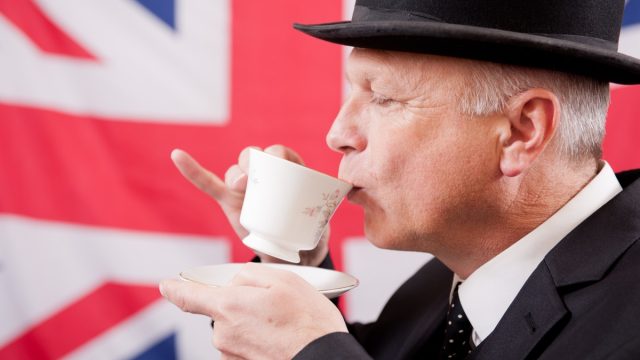10 British Words That Don’t Make Sense in America

The fascination with the royal family, the use of the metric system, and the cultural imperative to make time for tea aren’t the only things Americans find perplexing about life across the pond. In fact, perhaps the most confusing thing about British culture to Americans is the language we supposedly share. Many U.K. slang terms are unrecognizable in America, like the 10 terms below. (Spoiler alert: “Pants” aren’t always what you think they are!)
1. Bagsy
According to BBC America, this slang word is the British version of “dibs.” In the U.K., you would just proclaim “bagsy” instead. And, similar to the “dibs” system in the U.S., once a person utters “bagsy” in any number of different circumstances, no exceptions are granted to those who were too slow to call out the word first.
Example: “Bagsy on the front seat!”
2. Chinwag
For those who aren’t familiar with the term “chinwag,” it’s used in place of the word “chat” in the U.K. So, when you’re going to have a “chinwag” with someone, you’re simply planning on talking with them.
Example: “I think it’s time that I had a chinwag with your teacher about your last report card.”
3. Cashpoint
If a British person has ever asked you to point them toward the nearest “cashpoint,” you likely responded with a look of confusion as opposed to usable directions. To ensure you’re prepared for your next money-related encounter with a Brit, know that the Macmillan Dictionary defines “cashpoint” as an ATM.
Example: “They don’t accept credit cards, so let’s hit up the cashpoint before we head to the pub.”
4. Chav
You’ve likely never heard this British slang uttered in America for one very solid reason—what’s being described simply doesn’t exist outside of the U.K. According to Merriam-Webster, a “chav” is a young person, specifically in Great Britain, known for “engaging in aggressively loutish behavior especially when in groups and for wearing flashy jewelry and athletic casual clothing (such as tracksuits and baseball caps).”
Example: “Don’t let all those gold chains fool you—he’s just another chav with no ambition.”
5. Kip
Since there is no easy translation for the British word “kip,” its usage proves confusing to most Americans. As World Wide Words explains, British people use the “kip” to explain a variety of acts that involve sleeping. It can be used in lieu of “nap,” or as a means of describing a longer period of sleep.
Example: “I could really use a quick kip before my workout.”
6. Doddle
Instead of simply calling something “easy,” Brits use the term “doddle.” According to the Collins Dictionary, “doddle” is a noun used to indicate that something is effortless. So, when you say that something is a “doddle,” you’re just saying it’s a piece of cake.
Example: “This job interview is sure to be a doddle.”
7. Plonk
In America, “plonk” might refer to the sound that occurs when something is hit or plucked. However, across the pond, the term means something entirely different: cheap or inferior wine.
Example: “At this point, the only wine that I can afford is that awful grocery store plonk.”
8. Rashers
Though Americans have yet to find a word to succinctly describe a perfectly-sliced piece of breakfast pork, Brits have this culinary accomplishment covered. According to the Cambridge Dictionary, “rasher” is another word to describe a thin slice of bacon.
Example: “My favorite part of this breakfast is the huge stack of rashers.”
9. Bobbins
No, this British term has nothing to do with sewing equipment. According to the Collins Dictionary, “bobbins” is a plural noun that refers to a “matter that is worthless or of inferior quality.” This term is derived from the Cockney rhyming slang phrase “bobbins of cotton,” meaning “rotten.”
Example: “That movie was bobbins. I can’t believe it was all a dream in the end!”
10. Pants
In Britain, “pants” go beyond their American definition to become both a noun (meaning “underpants”) and an adjective (referring to something that is just plain “rubbish”), according to Urban Dictionary.
Examples: (Noun) “I had a nightmare that I showed up to work in just my pants.” (Adjective) “Your opinion is pants.”
And if you want some more etymology knowledge, here are The Shocking Backstories for Common Words You Use All the Time.
To discover more amazing secrets about living your best life, click here to follow us on Instagram!